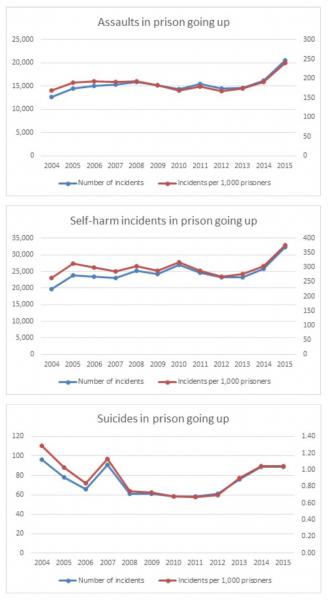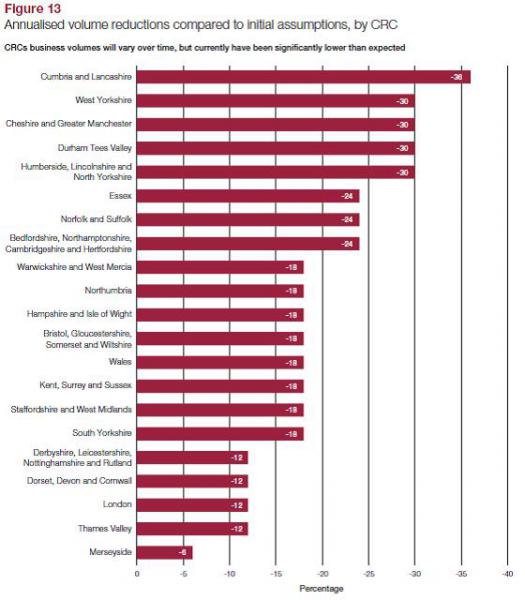Two developments this month point to deep problems at the heart of the prison and probation systems in England and Wales.
Two developments this month point to deep problems at the heart of the prison and probation systems in England and Wales.
Grim news on prisons
On prisons, new figures out yesterday paint a grim picture of a prison system facing rising assaults, self-harm incidents, and suicides.
The blue lines in the graphs below show the trend in incidents since 2004, mapped against the left-hand scale. The red lines, the trend per 1,000 prisoners over the same period, mapped against the right-hand scale.
In the case of assaults, the number of incidents went up from some 12,600 in 2004 to 20,500 in 2015. The per prisoner number of assaults also went up, from 169 per 1,000 prisoners in 2004 to 240 in 2015.
 Self-harm incidents also grew, from 19,700 incidents in 2004 to 32,300 in 2015. Per prisoner self-harm likewise grew, from 264 per 1,000 prisoners to 377.
Self-harm incidents also grew, from 19,700 incidents in 2004 to 32,300 in 2015. Per prisoner self-harm likewise grew, from 264 per 1,000 prisoners to 377.
Those looking for a more positive gloss might point to the suicide data, which show a decline from 96 incidents in 2004 to 89 in 2015. Per prison suicide incidents also fell, from 1.29 per 1,000 prisoners to 1.04.
Yet the decline in suicides ended in 2011. It has been rising since then. Taking a longer view, we have got used to a level of suicide that is much higher than has historically been the case. There were 37 suicides in prison in 1988, for instance, and 16 in 1978.
These disturbing trends – markers of the deep well of misery and despair that the prison system in England and Wales represents – place the current Justice Secretary's hubristic plans for 'reform prisons' in sharp relief.
Indeed, the notion that prisons can be meaningful places of reform and rehabilitation is a fantasy nursed by numerous governments over many years.
The 'reform prisons' programme and plans to build nine new prisons, are a tragic distraction from the much more important task of delivering decent, humane regimes, and ending the unnecessary imprisonment of tens of thousands of people every year.
Probation reforms looking dicey
A couple of years ago I argued that the privatisation of the probation service – the so-called 'Transforming Rehabilitation' programme – would be something of a slow motion disaster. Ministers might push through their ill-thought-out plans, I wrote. The problems would come in the implementation.
A report out this week from the National Audit Office (NAO) notes that the Ministry of Justice 'successfully restructured the probation landscape and avoided major disruptions in service'. But it goes on to add that 'this is only the beginning' and stresses that the the Ministry of Justice needs to 'stabilise and improve' how the new system is operating.
 The most striking finding in the report is the yawning gap between the estimated caseload volumes the new private 'Community Rehabilitation Companies' (CRC) used to cost up their bids, and the actual caseload volumes they are currently working with.
The most striking finding in the report is the yawning gap between the estimated caseload volumes the new private 'Community Rehabilitation Companies' (CRC) used to cost up their bids, and the actual caseload volumes they are currently working with.
Among the 21 CRCs, four have caseloads one tenth lower than their estimates; eight have caseloads a fifth lower. A further three are falling short by a quarter and five have a shortfall of a third.
The CRCs are paid according to the number of cases they manage. Fewer cases therefore means less money.
This may be something the CRCs can manage in the short-term. Over the lifetime of their contracts these shortfalls could place them under significant financial pressure.
As the NAO report points out: 'CRCs had proposed to raise significant levels of external debt to fund transformation activity and bridge their financial position during the first two years of their contracts. Lower than expected revenues increase the risk that CRCs may breach the terms of their debt facilities'.
This is polite auditor speak for 'looks a bit dicey to us'.
There is little glory in claiming success over the implementation of a badly thought-through set of reforms, and the Transforming Rehabilitation programme was particularly badly thought-through.
Ministers and civil servants would do well to place a premium on stabilising the current system in the short-term. It is also to be hoped that the NAO report will act as a spur for a longer-term rethink.